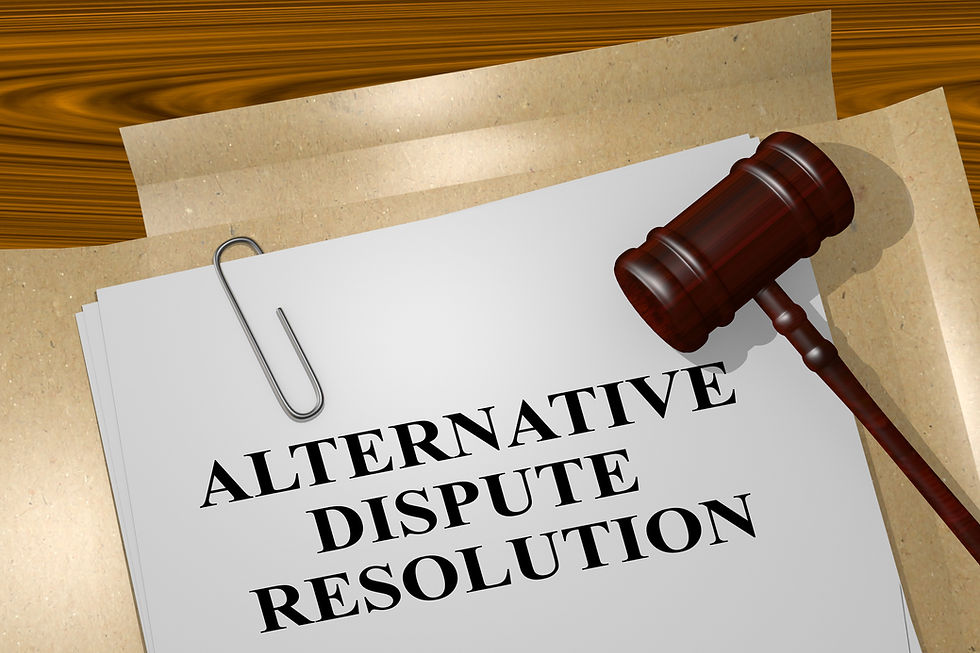How to Resolve Disputes Without Going to Court
- Leslie A. Farber

- Feb 20, 2017
- 3 min read
Updated: Jul 3, 2019

Court trials can be stressful, time consuming and expensive. Fortunately, not every case needs to be decided by a judge or jury.
Alternative Dispute Resolution (ADR) refers to any means of settling disputes outside of the courtroom. ADR processes typically can include neutral evaluation, negotiation, mediation and arbitration.
Because ADR programs are usually less costly and more efficient than litigation, they are being used more and more often to help resolve a wide variety of disputes. These range from child custody, visitation and divorce actions to claims involving personal injuries, automobile accidents, small-claims matters, landlord-tenant disagreements and employment disputes.
In some cases, one of the main advantages of this form of settling disputes is that, in processes such as mediation, it allows the parties to control the process themselves and to collaborate to resolve their issues. This often results in longer-lasting outcomes and finding more creative solutions than a court may be legally allowed to impose. However, in many consumer contracts and employment contracts (even employment applications), individual persons are forced by the larger corporate entity to agree to arbitration, which takes away the right to a trial with a jury, the right to participate in a class action case, and vastly limits the ability to conduct discovery.
The New Jersey Judiciary uses the term "complementary" dispute resolution (CDR) instead of "alternative" dispute resolution because it views dispute resolution processes as complements to the traditional trial processes, rather than as alternatives.
The state’s primary CDR processes are:
Arbitration: A process similar to an informal trial involving limited discovery and simplified rules of evidence. An impartial third party hears each side of a dispute and renders a decision. In binding arbitration, the parties agree to accept the arbitrator’s decision as final. In nonbinding arbitration, the parties may choose not accept the decision and move on to a trial.
Mediation: A collaborative process where a third-party mediator works with the parties to come to a mutually acceptable solution. The mediator does not decide the case, but helps the parties communicate and try to settle the dispute themselves. Mediation can be particularly effective when family members, neighbors or business partners have a dispute.
Settlement proceedings: A neutral third party or panel provides a suggested settlement in order to assist the parties in voluntarily agreeing to resolve their dispute.
The New Jersey Supreme Court has approved a variety of CDR programs for use in Municipal, Family, and Civil courts, as well as some that can be used in the General Equity Division (including mortgage foreclosures) and Probation. Although it may vary by program and location, complementary dispute resolution services are generally provided by attorneys, judicial personnel, community agencies and trained volunteers.
Do You Need to Hire an ADR Attorney?
Although alternative dispute resolution is intended to save time and money and reduce the stress involved in going to court, many people still to hire attorneys to represent them during the proceedings. They may also choose to work with an attorney to explore possible pre-proceeding solutions or strategies.
As with any legal issue, you are better off consulting a lawyer who is not only familiar with the collaborative ADR process, but has experience in your particular type of dispute. You will find that many arbitrators and mediators are also attorneys. Depending on the circumstances you may consider hiring a single lawyer to work with all parties in an ADR proceeding, rather than hiring a lawyer to represent each party. He or she can act as an impartial third party to guide you towards a resolution and ensure that any proposed solutions are legal.
If you are involved in a dispute that you think may be resolved through ADR, I can help you understand and evaluate your options. Please call me at 973-509-8500 x213 or email me at: LFarber@LFarberLaw.com.
The contents of this writing are intended for general information purposes only and should not be construed as legal advice or opinion in any specific facts or circumstances.






